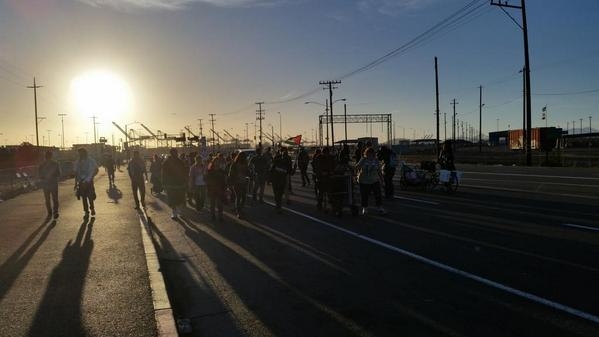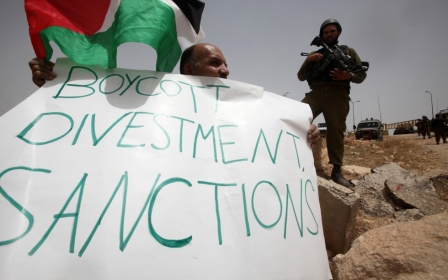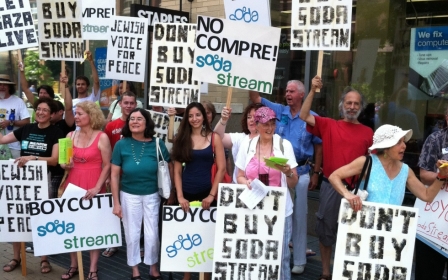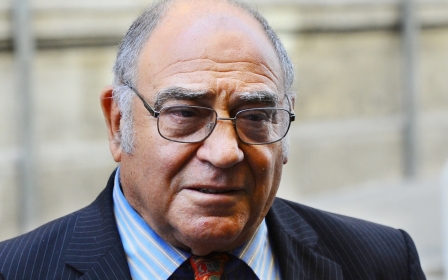Palestinian activists claim victory for 'Block the Boat' campaign

Pro-Palestine activists in California’s San Francisco Bay Area declared a “decisive victory” on Tuesday after receiving news that an Israeli ship had redirected its course to Russia.
It was the first time that the Block the Boat campaign - which had planned to picket the Zim Beijing upon its arrival at the port of Oakland - had forced a ship to change its course entirely.
While the long-term significance was not immediately clear, supporters and opponents of the campaign have said another success in preventing a ship owned by Israel’s Zim Integrated Shipping Services from unloading in Oakland could drive the company out of the port altogether.
“All indications lead us to believe that it is possible for Zim to withdraw its operations from the port of Oakland,” Lara Kiswani, executive director of San Francisco’s Arab Resource and Organising Centre and a spokesperson for Block the Boat Oakland, told Middle East Eye.
Sam Levine, executive director of the Zionist Organisation of America Western Region, agreed that the campaign was on the verge of pushing Zim out of the port.
“This situation is unacceptable, and cannot be allowed to continue,” he told MEE. “Either the police need to arrest these protesters who are blocking commerce, or the union workers need to grow up and do their jobs. If this happens again I think the Zim ship will have no choice but to stop coming to Oakland.”
“You can hear it in their voices”
Launched in Oakland on 16 August, during Israel’s summer military offensive against the Palestinian Gaza Strip, the Block the Boat campaign aims to prevent vessels owned by Zim, Israel’s biggest cargo shipper, from unloading their contents in North American ports.
“The Israeli assault on Gaza during July and August 2014, and the resistance of the Palestinian people, was the catalyst for a series of actions in solidarity with Palestine,” Kiswani said.
It follows a similar demonstration in 2010, when Oakland protesters kept a Zim ship from unloading for 24 hours to protest a lethal Israeli naval attack on a “Freedom Flotilla” bound for Gaza.
Participants cite Zim’s partial ownership by the Israel Corporation, a quasi-public body, and its services to the Israeli government and Zionist institutions, as well as a broader Palestinian call for the boycott, divestment and sanctions (BDS) of Israeli enterprises and contractors.
“The role that Zim ships played in establishing the illegal and immoral occupation of Palestine is well-documented,” Vicki Tamoush, a Block the Boat Los Angeles organiser, told MEE. “Our message to Zim and to the Israeli government is that we oppose apartheid and the Zionist regime by blocking these ships every time they attempt to dock.”
Since 16 August, the protests have spread as far north as Vancouver and as far south as Tampa, preventing or delaying Zim ships from unloading for several days in the ports of Oakland, Los Angeles, Tacoma, and Seattle.
Roqayah Chamseddine, a journalist in Sydney, investigated the financial costs of the campaign for Lebanon’s al-Akhbar newspaper, finding deep losses to Zim and its customers.
“After accessing the list of businesses, I began calling, and leaving messages until someone would speak to me,” she told MEE. “Those who did speak to me allowed me to see for myself as to how much damage a BDS action can actually have.”
“When I spoke to those business owners, and with workers, a number of them were troubled and you can hear it in their voices,” she added.
An Oakland organiser, who asked to remain anonymous, estimated Zim’s losses alone as “likely in the millions at this point.”
“It is hard to put a dollar amount on the damage to their corporate reputation and future lost clients now that they are the target of a large and public boycott movement,” Tamoush said.
These mounting losses have thrown Zim’s future in Oakland, and on the West Coast generally, into doubt.
“An injury to one”
The protests are unique among pro-Palestine campaigns, especially in the United States, because of the role of organised labour.
While the International Longshore and Warehouse Union, whose members unload ships on the West Coast, has declined to support the picket lines, its rank and file have usually honoured them, refusing to cross and handle Zim cargo.
“The ILWU leadership has generally been more conservative than Local 10,” Jack Heyman, a retiree from Local 10, the ILWU branch in the port of Oakland, and chair of the Transport Workers Solidarity Committee, which supports the campaign, told MEE.
In 1984, he added, Local 10 members refused to unload South African cargo to protest that country’s apartheid government, an action opposed by the ILWU leadership, which called it illegal.
“The rank and file defied the leadership and took the decisive action anyway,” Heyman said. “And our experience has been similar in the fight against Israeli apartheid.”
Michael Letwin, past president of New York’s Association of Legal Aid Attorneys (United Auto Workers Local 2325) and a co-founder of Labour for Palestine, told MEE, “By honouring Block the Boat's picket line, rank and file ILWU members have upheld the most fundamental labour principal of solidarity: an injury to one is an injury to all.”
“From Gaza to Ferguson”
Oakland activists also cited the campaign’s ties to community issues as a reason for its strength there.
“There is a growing Bay Area movement against state violence, and the US-Israel relationship has been exposed as instrumental to that violence,” Kiswani said. “That is why we have been so successful in our actions at the port. Communities of colour, workers and the poor, are standing on the side of justice and mobilising with us to stop Zim.”
“We are seeing law enforcement, surveillance, and counter-terrorism tactics exported across the world, with the US and Israel playing a central role in this global repression,” Mohamed Shehk, national media and communications director of Critical Resistance, a prison abolition group, and another spokesperson for Block the Boat Oakland, told MEE.
“What this looks like here is that the long-time violence and repression against black and brown people is being supplemented by the increased militarisation not just of police but of everyday life,” he added. “But as a result, we are also seeing enormous solidarity being expressed among those who are resisting, from Gaza to Ferguson.”
“We know we are making an impact”
On Sunday, Block the Boat activists in Oakland, where the Zim Beijing had been scheduled to dock Saturday, marched and rallied to celebrate its delay.
Also on Sunday, Labour for Palestine and other groups held a picket line to support Block the Boat protests on the West Coast outside the Israeli consulate -general in New York.
On Monday, Block the Boat activists marched to Zim’s local office in Seattle, delivering a letter demanding that the company “use [its] position of power within the State of Israel to make Israel comply with the demands of the international Boycott, Divestment and Sanctions movement.”
“We know we are making an impact,” Kiswani said. “And we are encouraged by the wave of Block the Boats spurring up throughout North America. Oakland has proven to be successful in stopping Zim. We hope that other cities will continue to build on this success.”
Shehk said the campaign’s relevance had continued as the Gaza offensive that sparked it disappeared from headlines.
“We are continuing this action because even as the recent bombing of Gaza has stopped, Gaza is still crippled by an Israeli siege, and Israel continues to colonise and ethnically cleanse Palestine through murder, imprisonment, Jewish settlement expansion, and home demolition,” he said. “The anti-colonial struggle in Palestine is not about one particular bombardment, it's about liberating Palestine from Israeli oppression that has been ongoing since 1948.”
“A victory that is very practical”
The demonstrations, which usually occur early in the morning, can take a toll on their participants, Tamoush said.
“It’s not the easiest form of protest. In order to make the drive to Long Beach and be out at the port by 5:30 a.m. to greet the participants as they arrive, I have to get up at 3:45 a.m. each time we do this. But when that alarm goes off and my eyes don’t want to open, I think about Gaza. I think about that family I know in Nablus. I think about the checkpoints.”
With one of the most significant victories for pro-Palestine activists in the United States to date apparently drawing close, the campaign is unlikely to abate soon, organisers agree.
“Kicking Zim out of Oakland for good would be an enormous victory for us, but a victory that is very practical,” Shehk said. “Zim would be foolish to continue coming to Oakland.”
New MEE newsletter: Jerusalem Dispatch
Sign up to get the latest insights and analysis on Israel-Palestine, alongside Turkey Unpacked and other MEE newsletters
Middle East Eye delivers independent and unrivalled coverage and analysis of the Middle East, North Africa and beyond. To learn more about republishing this content and the associated fees, please fill out this form. More about MEE can be found here.




